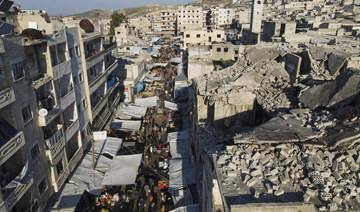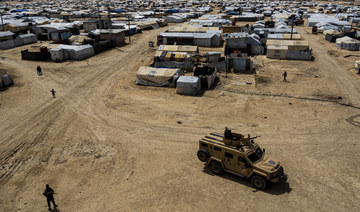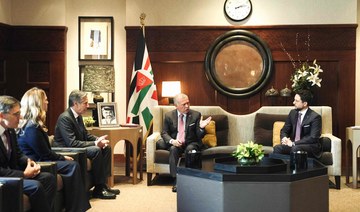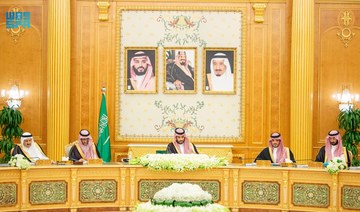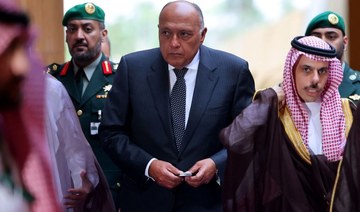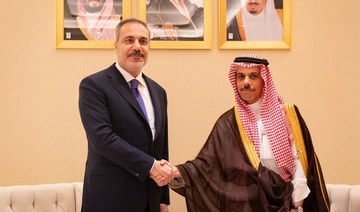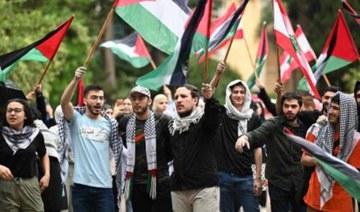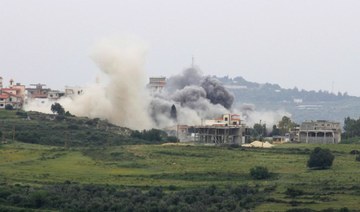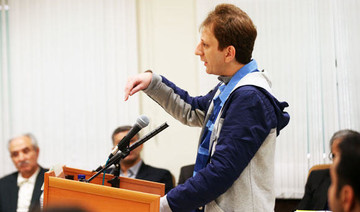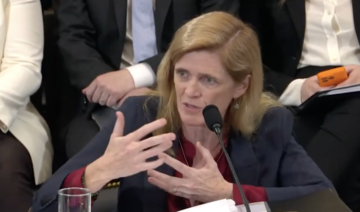HARBANUSH, Syria: Ahmed Al-Hakim’s 27-year-old brother was tortured to death in prison in Syria’s militant-run northwest, sparking rare protests amid accusations from residents and activists of rights violations in the opposition bastion.
“We protested and rose up against the Assad regime in order to be rid of injustice,” said Hakim, 30, referring to Syrian President Bashar Assad.
Now “we find ourselves ruled with the same methods,” he told AFP, crouched near his brother Abdel-Kader’s grave, flowers and plants placed in the freshly turned soil.
Syria’s 13-year-old conflict, sparked by Assad’s brutal repression of anti-government protests, has drawn in foreign armies and militants and killed more than 500,000 people.
Around half of Idlib province and parts of neighboring Aleppo, Hama and Latakia provinces are controlled by Hayat Tahrir Al-Sham (HTS), an alliance of Islamist factions led by Syria’s former Al-Qaeda affiliate.
Accusations of torture and other rights violations have increased since last year when HTS launched a crackdown on suspected “agents” for Damascus or foreign governments.
Security forces from the Islamist group have detained hundreds of civilians, fighters and even prominent HTS members, providing no information to families, said residents and the Syrian Observatory for Human Rights war monitor.
Abdel-Kader’s death triggered rare protests in Idlib province — home to some three million people, many displaced from government-held areas — in recent weeks and calls for the release of detainees, according to the Britain-based Observatory.
The war monitor said demonstrations are taking place daily in towns and villages, most recently on Sunday evening, when protesters chanted slogans against HTS leader Abu Mohammed Al-Jolani.
Jolani has said the protesters’ demands were “mostly justified,” and announced changes including the restructuring of the security force running the prisons.
HTS’s media office told AFP the group was “seriously examining” the protesters’ demands and would “tighten security bodies’ work (and) improve prison infrastructure... to deal with any dysfunction.”
Hakim, an accountant originally from Aleppo province, said his brother participated in anti-government protests before becoming a fighter and was part of the small HTS-aligned Jaish Al-Ahrar group.
He said the faction told Abdel-Kader to report to HTS, considered a terrorist organization by several Western countries, on suspicions of collaborating with the government.
Abdel-Kader handed himself in on March 16 last year “on the understanding that he would be out... in a week at most,” Hakim said.
After detaining him for several months and then saying he was “in good health,” HTS stonewalled the family’s requests for information, according to Hakim.
Months later, a factional contact and a former fighter told the family Abdel-Kader had died due to torture.
Jaish Al-Ahrar only notified them formally on February 22 that Abdel-Kader was dead.
The family found his grave was “new but the date of death written on it was around 20 days after his arrest,” a distraught Hakim said.
Former detainees told Hakim his brother was “beaten with piping until he lost consciousness, and tied up by his hands for days without food or water.”
Abdel-Kader denied any wrongdoing “so they increased the torture until they killed him,” they told Hakim.
One former detainee said Abdel-Kader was tortured so severely that “he couldn’t walk because his feet were swollen and filled with pus.”
The day he died, the guards “tortured him for six hours” and after he was returned to the cell he “kept vomiting,” Hakim was told.
The grim treatment echoes torture that rights groups have reported in Syrian government-run prisons, particularly since 2011, with tens of thousands of people forcibly disappeared and arbitrarily detained.
Amnesty International in 2017 accused authorities of committing secret mass hangings in the notorious Saydnaya facility.
The Observatory said HTS this month released 420 prisoners in an amnesty aimed at quelling the discontent in the northwest.
But it made no difference for Noha Al-Atrash, 30, whose husband Ahmed Majluba has been detained since December 2022, accused alternately of theft and belonging to an extremist group.
“He has been arrested five times... there is no proven reason for his detention,” she said from her home in Idlib city as her two young children held photos of their father, 38.
Majluba, a laborer, was shot in the leg “during a previous period” in HTS detention, Atrash said.
“I go to the protests, I make posters with pictures of my husband on them, and I take the kids,” said Atrash who was covered head-to-toe in a niqab.
She and her children were themselves detained for around 20 days after she hounded authorities for information.
During one prison visit, she saw her husband’s hand was broken and “his face was swollen from beatings,” she said.
“They’ve asked us to pay $3,000 to have him released,” Atrash said, but added that she doesn’t have the money.
“I have no choice but to protest... I won’t give up as long as they have my husband,” she said defiantly.
The UN’s independent commission of inquiry on Syria said recently it had “reasonable grounds to believe” HTS members had committed “acts that may amount to the war crimes of torture and cruel treatment and unlawful deprivation of liberty.”
Bassam Alahmad from the Paris-based Syrians for Truth and Justice said people were “fed up with HTS violations” such as “arbitrary arrests and torture.”
He urged families and rights groups to gather independent, credible evidence for potential future investigations.
In a camp near the Turkish border, Amina Al-Hamam, 70, said her son Ghazwan Hassun was detained by HTS in 2019 on suspicion of “informing for the regime.”
“Some people tell us he’s dead, others say he’s alive,” the distressed elderly woman said, sitting with her son’s children, aged five and nine.
Days before being detained, Hassun, a defector from the Syrian police, had published a video criticizing HTS, his family said.
During Hamam’s only visit — eight months after he was detained — Hassun told her guards used a torture method notorious across Syria where the victim has their hands tied behind their back and is suspended from them for hours.
The family has heard nothing since about the 39-year-old but has vowed to keep fighting.
“I cry for him night and day,” said Hamam.
“We fled from injustice, but here we have seen worse.”
Syrians missing, dying from torture in militant-run prisons
https://arab.news/cpzs8
Syrians missing, dying from torture in militant-run prisons
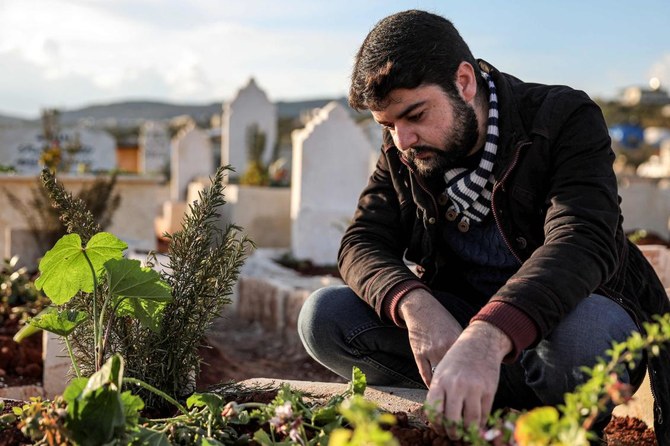
- “We protested and rose up against the Assad regime in order to be rid of injustice,” said Hakim, 30, referring to Syrian President Bashar Assad
- Accusations of torture and other rights violations have increased since last year when HTS launched a crackdown on suspected “agents” for Damascus or foreign governments
Blinken says he will press Netanyahu on Gaza aid measures during Israel trip
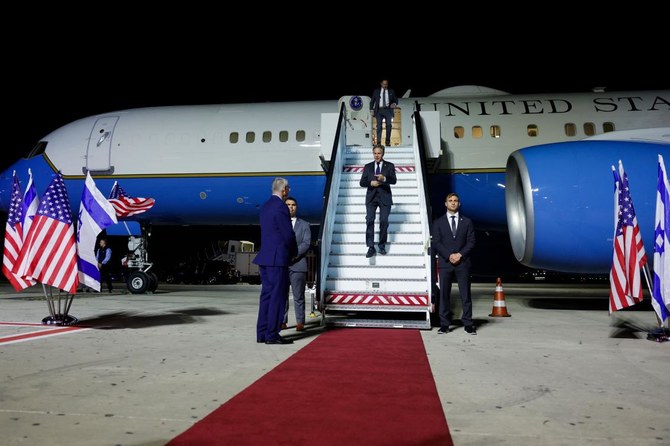
- Visit comes month after US President Biden issued stark warning to Israeli PM
- Blinken on a tour of Middle East, seventh since region plunged into conflict on Oct. 7
AMMAN: US Secretary of State Antony Blinken said on Tuesday he would discuss with Prime Minister Benjamin Netanyahu measures that Israel still needs to take to increase the flow of aid into Gaza during his planned talks in the country on Wednesday.
Blinken arrived in Israel on Tuesday to also push for a much awaited ceasefire between Israeli forces and Hamas militants in Gaza.
Ahead of his arrival in Israel, Blinken spoke to reporters at a warehouse of the Jordan Hashemite Charity Organization where aid shipments from US-based charities are gathered.
While there are some improvements in the humanitarian aid situation in the densely populated enclave, he said, much more needs to be done to ensure assistance reaches people in a sustained manner.
“I’m now able to go to Israel tomorrow and go over with the Israeli government the things that still need to be done if the test is going to be met of making sure that people have what they need,” Blinken said.
“And I’ll be doing that (on Wednesday) directly with Prime Minister Netanyahu and other members of the Israeli government,” he said.
Blinken’s check-in with Netanyahu on aid will take place about a month after US President Joe Biden issued a stark warning to Netanyahu, saying Washington’s policy could shift if Israel fails to take steps to address civilian harm, humanitarian suffering, and the safety of aid workers.
A spiraling humanitarian crisis has prompted calls from Israel’s Western and Arab partners to do more to facilitate the entry of aid to Gaza, where most people are homeless, many face famine, disease is widespread, and where much civilian infrastructure lies in ruins.
REGIONAL TOUR
Blinken is on a tour of the Middle East, his seventh since the region plunged into conflict on Oct. 7 when Palestinian Hamas militants attacked Israel, killing 1,200 people and abducting 253 others, according to Israeli tallies.
In response, Israel has launched a relentless assault on Gaza, killing more than 34,000 Palestinians, local health authorities say, in a bombardment that has reduced the enclave to a wasteland. More than one million people face famine, the United Nations has said, after six months of war.
The first shipments of aid directly from Jordan to northern Gaza’s newly opened Erez crossing will leave on Tuesday, goods are also arriving via the port of Ashdod, and a new maritime corridor will be ready in about a week, Blinken said.
“But more still needs to be done,” he said. “We still have to have a deconfliction mechanism that’s effective and works — that’s a work in progress,” Blinken added.
He said there should also be a clear list of items needed in Gaza to avoid “arbitrary denials” — a reference to a process of rigorous inspections of aid shipments that has seen some trucks stranded at border crossings.
US and Egyptian presidents warn of danger of military escalation in Rafah
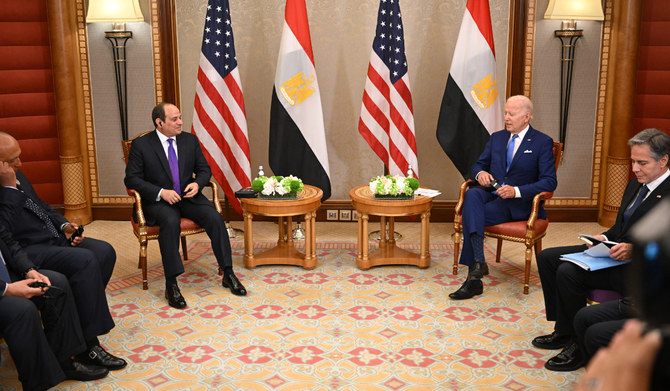
- The leaders say an Israeli assault on the Gazan city would exacerbate the humanitarian crisis and have repercussions on security and stability across the region
CAIRO: The Egyptian president, Abdel Fattah El-Sisi, and his US counterpart, Joe Biden, on Tuesday discussed the efforts being made by Egypt to encourage a ceasefire agreement in Gaza between Israel and Hamas and secure the release of hostages.
Ahmed Fahmy, a spokesperson for the presidency, said the two leaders expressed concern about the potential danger of a threatened Israeli military escalation in the city of Rafah in southern Gaza, which has become the final refuge for more than a million Palestinians displaced by fighting from other parts of the territory. They said it would add a further, catastrophic dimension to the already worsening humanitarian crisis in Gaza, and have wider repercussions on security and stability across the region.
The war began with the Oct. 7 attacks by Hamas on Israel, in which 1,170 people were killed, according to a tally by news agency Agence France-Presse. The militants also took about 250 hostages; Israeli authorities estimate 129 of them are still being held in Gaza, including 34 believed to be dead.
During Biden’s telephone call to El-Sisi, the Egyptian president stressed the need for humanitarian aid workers to be granted full and unrestricted access to Gaza, and highlighted the intensive efforts Egypt has been making in support of the aid effort.
The presidents agreed on the importance of preventing any regional expansion of the conflict, and reaffirmed that a two-state solution to the long-running dispute between Israel and Palestine is the best way to achieve peace, security and stability in the Middle East.
They also highlighted the strategic partnership between Egypt and the US, and their continuing efforts to strengthen bilateral cooperation at all levels.
UNICEF demands immediate ceasefire in southern Lebanon, protection of children
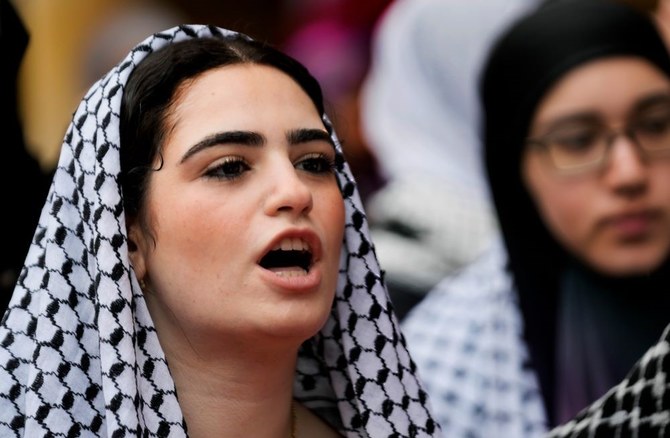
- Israeli airstrikes destroy houses, wounding individuals
- Students from the American University of Beirut and the Lebanese American University called on their administrations “to boycott companies and institutions supporting Israel”
BEIRUT: Lebanon’s Disaster Risk Management Unit announced that the total death toll from Israeli attacks since Oct. 8 has reached 438 people.
According to the latest report issued by the Lebanese Ministry of Health, eight children were among the dead and 75 children were among the 1,359 people injured since the escalation of hostilities.
The UN Children’s Fund expressed its concern over “the continuing hostilities in southern Lebanon that are taking a devastating toll on the population, forcing around 90,000 people, including 30,000 children, from their homes.”
UNICEF called for “an immediate ceasefire and the protection of children and civilians,” and indicated that “the increase in armed conflict has damaged infrastructure and civilian facilities, causing severe damage to basic services that children and families depend on, including nine water stations serving 100,000 people at least.
“More than 70 schools are currently closed, affecting around 20,000 students and significantly affecting their education. Around 23 healthcare facilities — serving 4,000 people — are closed due to the hostilities.”
UNICEF’s representative to Lebanon, Edouard Beigbeder, expressed the organization’s deep concern. “As the conflict impacting the south of Lebanon is in its seventh month, we are deeply alarmed by the situation of children and families who have been forced from their homes and the profound long-term impact the violence is taking on children’s safety, health, and access to education.
“As long as the situation remains unstable to this extent, more children will suffer,” Bigbeder warned. “Protection of children is an obligation under the International Humanitarian Law and every child deserves to be safe.”
In a statement, UNICEF indicated that before the outbreak of the conflict, basic services in Lebanon, including health and education systems, were in danger of collapsing after years of overwork. The unprecedented economic and financial crises that have hit the country since 2019 have exacerbated existing economic vulnerabilities.
Following the displacement of residents from the southern border region, UNICEF, in collaboration with its partners, has been providing “crucial aid to affected families seeking refuge in shelters. Emergency cash assistance, facilitated in partnership with the Ministry of Social Affairs, has been extended to meet the immediate needs of 85,000 individuals. Some displaced children have managed to resume their education in official schools, receiving essential supplies and transportation support.”
On Tuesday, hostilities persisted intermittently on the southern front between Hezbollah and the Israeli military.
An Israeli airstrike targeted a house along the Kafr Kila — Al-Adisa road, destroying it and causing severe damage to nearby properties and homes. Additional Israeli airstrikes struck homes and commercial establishments in the towns of Aita Al-Shaab, Yaroun, Jebbayn, the outskirts of Naqoura, Alma Al-Shaab, and Jabal Al-Labouneh.
In solidarity with Gaza and echoing student activism in US universities, Lebanese university students organized sit-ins on campus or nearby areas, brandishing Lebanese and Palestinian flags and demanding the liberation of Palestine and a cessation of attacks on southern Lebanon.
Students from the American University of Beirut and the Lebanese American University in Beirut called on their administrations “to boycott companies and institutions supporting Israel.”
Similar demonstrations unfolded in several private universities across Lebanon, including Beirut Arab University, Lebanese International University, Saint Joseph University, Haigazian University, and Holy Spirit University of Kaslik.
Iran commutes a tycoon’s death sentence to 20 years in prison
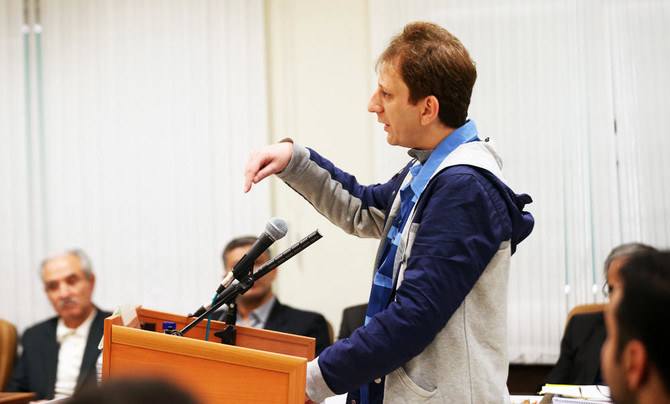
- Babak Zanjani was sentenced to death in 2016 over a number of charges
- An appeal for amnesty by Zanjani was reviewed and his death sentence was “commuted to a 20-year prison term
TEHRAN: Iran’s judiciary said Tuesday that it commuted a death sentence for a tycoon to 20 years in prison after he returned around $2.1 billion in assets from illegally selling oil abroad, the official IRNA news agency reported.
Babak Zanjani, 48, was sentenced to death in 2016 over a number of charges, including money laundering, forgery and fraud that disrupted the country’s economy.
IRNA quoted judiciary spokesman Asghar Jahangir as saying that an appeal for amnesty by Zanjani was reviewed and his death sentence was “commuted to a 20-year prison term after approval by the Supreme Leader.”
Ayatollah Ali Khamenei has the final say on all state matters and occasionally issues pardons.
Jahangir said as part of Zanjani’s 2016 sentence, he had the right to an amnesty or commutation of his death sentence if he returned the assets, compensated for damages and expressed regret for wrongdoing. The spokesman said that Zanjani cooperated with the judiciary to locate the assets abroad in recent years while he was in prison, and all the money was returned.
Zanjani was arrested in 2013 shortly after the election of then President Hassan Rouhani as part of a crackdown on alleged corruption during the rule of former President Mahmoud Ahmadinejad.
Authorities said then that Zanjani owed more than 2 billion euros ($2.1 billion) for oil sales he made on behalf of Ahmadinejad’s government. Zanjani was one of Iran’s wealthiest businessmen, with a fortune worth an estimated $14 billion.
The commutation of Zanjani’s sentence indicates that Iran’s government is in need of revenue after years of US sanctions on the country.
In 2018, then President Donald Trump pulled the US out of a nuclear deal with Iran that had aimed to lift sanctions on Iran in return for the capping of the country’s nuclear activities. Since then, Iran has found it difficult to sell its crude, the country’s main source of foreign revenue. After Trump’s unilateral withdrawal from the deal, Iran’s rial currency tumbled.
In 2014, Iran executed another billionaire businessman, Mahafarid Amir Khosravi, for a $2.6 billion state bank scam in Iran.
UN chief demands investigators be granted immediate access to mass graves in Gaza
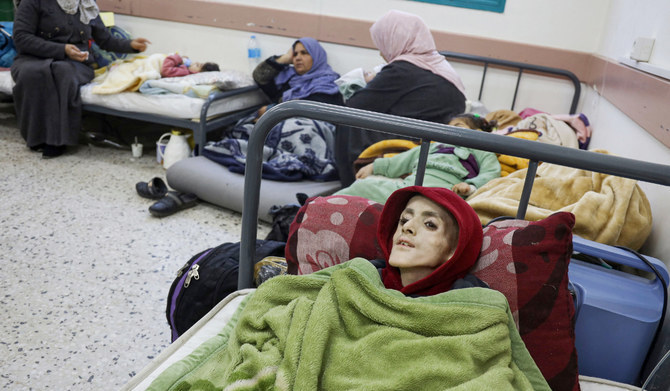
- Secretary-General Antonio Guterres says it is ‘imperative’ that forensic experts establish how hundreds of Palestinians died and came to be buried, or reburied, there
- The graves were discovered this month in several parts of the territory, including at Al-Shifa and Al-Nasser hospitals, both of which were attacked by the Israeli army
NEW YORK CITY: UN Secretary-General Antonio Guterres on Tuesday said he was deeply alarmed by reports that mass graves had been discovered in several places in Gaza.
He called for independent international forensics experts to be granted immediate access to the sites to establish the circumstances in which hundreds of Palestinians lost their lives and were “buried or reburied” there.
The mass graves were discovered this month in several parts of war-ravaged Gaza, including at Al-Shifa and Al-Nasser hospitals, both of which were attacked by the Israeli army. Graves were also found in Beit Lahia and Deir Al-Balah. Many women and children were among the dead.
At Al-Nasser alone, more than 390 bodies were discovered. Many showed apparent signs of being shot in the head, had their hands bound by zip ties, were stripped of their clothes, or were buried in hospital gowns with medical needles and tubing still attached to their skin.
The healthcare system in Gaza has been brought to its knees by the war; two-thirds of hospitals are dysfunctional and those that remain operational are seriously damaged. Guterres said some healthcare facilities “now resemble cemeteries.”
He added: “There are competing narratives around several of these mass graves, including serious allegations that some of those buried were unlawfully killed.
“It is imperative that independent international investigators, with forensic expertise, are allowed immediate access to the sites of these mass graves to establish the precise circumstances under which hundreds of Palestinians lost their lives and were buried, or reburied.
“The families of the dead and missing have a right to know what happened. And the world has a right to accountability for any violations of international law that may have taken place.”
Speaking at the UN headquarters in New York, Guterres once again expressed solidarity with the victims of the “unconscionable Hamas terror attacks of Oct. 7,” and with the hostages and their families and friends.
“Passover reminds us that the persecution of the Jews is as old as history itself,” he said. “We all have a duty to speak out against all forms of antisemitism, in communities, in the media and online.”
Nearly seven months after Oct. 7, the situation facing the people of Gaza “is worsening by the day,” Guterres said as he lamented the fact his incessant calls for a humanitarian ceasefire, the release of all hostages, and a significant increase in the amount of humanitarian aid flowing into the territory have been ignored.
“For the sake of the people of Gaza, for the sake of the hostages and their families in Israel, and for the sake of the region and the wider world, I strongly encourage the government of Israel and the Hamas leadership to reach an agreement,” he said.
“Without that, I fear the war, with all its consequences both in Gaza and across the region, will worsen, exponentially.”
He said a threatened Israeli military ground assault on the southern city of Rafah, where more than 1.2 million displaced Palestinians have taken refuge from bombardments elsewhere in the
territory, would be “an unbearable escalation, killing thousands more civilians and forcing hundreds of thousands to flee.”
He urged “those with influence over Israel to do everything in their power” to prevent such an incursion, noting that all members of the Security Council, and many governments, have expressed opposition to it.
Palestinians sheltering in Rafah “have very little to eat, hardly any access to medical care, little shelter and nowhere safe to go,” Guterres said.
“In northern Gaza, the most vulnerable — from sick children to people with disabilities — are already dying of hunger and disease. We must do everything possible to avert an entirely preventable, human-made famine.”
Although some progress had been made in humanitarian efforts, Guterres said “much more is urgently needed, including the promised opening of two crossing points between Israel and northern Gaza, so that aid can be brought into Gaza from Ashdod port and Jordan.”
A major obstacle to the delivery of aid across the territory remains the lack of guarantees of security for aid workers and the civilians they are trying to help.
“Humanitarian convoys, facilities and personnel, and people in need, must not be targets,” said Guterres.
“We welcome aid delivery by air and sea, but there is no alternative to land routes. I again call on the Israeli authorities to allow and facilitate safe, rapid and unimpeded access for humanitarian aid and humanitarian workers, including UNRWA (the UN Relief and Works Agency for Palestine Refugees), throughout Gaza.





